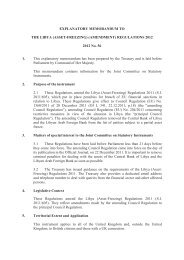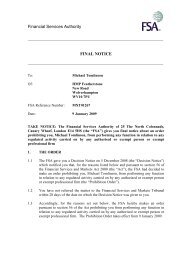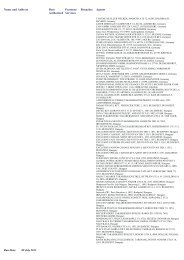FSA Annual Report 2006/07 - Better Regulation Ltd
FSA Annual Report 2006/07 - Better Regulation Ltd
FSA Annual Report 2006/07 - Better Regulation Ltd
You also want an ePaper? Increase the reach of your titles
YUMPU automatically turns print PDFs into web optimized ePapers that Google loves.
Section one – Promoting efficient, orderly and fair markets<br />
<strong>FSA</strong> <strong>Annual</strong> <strong>Report</strong> <strong>2006</strong>/<strong>07</strong><br />
19<br />
techniques, reduces the scope for<br />
criminals to launder money through<br />
the UK financial system and reduces<br />
the inconvenience to honest<br />
consumers.<br />
In September <strong>2006</strong> we published a<br />
consumer leaflet to raise awareness<br />
of the changes in identity<br />
requirements. We explained why<br />
firms are required to check<br />
customers’ identity and gave advice<br />
to people having difficulty proving<br />
their identity. We also explained<br />
how identity checks help prevent<br />
crimes such as identity theft and<br />
terrorist financing.<br />
During the year we visited 16 firms<br />
(including banks, investment banks,<br />
investment firms and insurers) to<br />
assess their systems and controls for<br />
managing Politically Exposed<br />
Persons (PEPs) risks. We found the<br />
firms largely complied with the<br />
JMLSG Guidance Notes and the<br />
Third EU Money Laundering<br />
Directive’s PEPs provisions.<br />
We have created a new Financial<br />
Crime and Intelligence Division.<br />
This will enable us to make more<br />
effective use of our financial crime<br />
expertise, with more specialist<br />
resources. We have also trained our<br />
supervisors to improve their analysis<br />
of the financial crime risks facing<br />
firms.<br />
Improving policy<br />
Many of our rules derive from<br />
European Community requirements;<br />
we are required to implement<br />
Directives on time and in full. Our<br />
approach is to copy out the text<br />
into our Handbook, adding<br />
interpretative guidance where that<br />
will be helpful. We add additional<br />
requirements only where there is a<br />
proven market failure and the<br />
proposal is justified by cost-benefit<br />
analysis. As with all proposed rules<br />
and guidance, we also consider the<br />
In February 20<strong>07</strong> we fined Nationwide Building Society £980,000 for failing<br />
to have effective systems and controls in place to manage its information<br />
security risks. These failings came to light following the theft of a laptop<br />
from an employee’s home. Nationwide was not aware that the laptop<br />
contained confidential customer information and did not investigate until<br />
three weeks after the theft. Nationwide’s failure to implement robust<br />
systems and controls potentially exposed its customers to an increased risk<br />
of financial crime.<br />
In November <strong>2006</strong> the High Court granted our application for interim<br />
restraint and freezing orders against Christian Orpin trading as PDS Business<br />
Finance. In our view, Mr Orpin operated a property scheme financed by<br />
deposits accepted from investors without authorisation, in breach of<br />
FSMA. Most deposit-taking and investment schemes require <strong>FSA</strong><br />
authorisation.<br />
In August <strong>2006</strong> and February 20<strong>07</strong> the High Court placed Securetrade &<br />
Title Company <strong>Ltd</strong> and Inertia Partnership LPP into liquidation following<br />
winding-up petitions we made to the Court. Both firms had acted in breach<br />
of FSMA by helping several overseas boiler rooms that were unlawfully<br />
promoting and selling shares to UK investors. Earlier in <strong>2006</strong> we publicised<br />
the risks arising from investing through boiler rooms, warning investors<br />
that they would not have access to our complaints or compensation<br />
schemes and that the typical boiler room investor loses £20,000.<br />
proportionality of our proposals as<br />
well as their potential impact on<br />
innovation and on the desirability<br />
of maintaining the competitive<br />
position of the UK.<br />
EU policymaking<br />
We have continued to contribute<br />
significantly to the Lamfalussy<br />
Committees’ work to achieve greater<br />
supervisory convergence within<br />
Europe. In particular, we chair the<br />
Committee of European Banking<br />
Supervisors (CEBS) Convergence<br />
Task Force, which is developing<br />
proposals for implementing the<br />
Francq <strong>Report</strong> recommendations on<br />
supervisory convergence. We<br />
support the work that the<br />
committees are now pursuing to<br />
develop their future strategies on<br />
convergence and cooperation.<br />
In its second interim report on the<br />
structure of regulation in the EU, the<br />
Inter-Institutional Monitoring Group<br />
found that the Lamfalussy structure<br />
is effective but there is scope for<br />
improvement. We support this broad<br />
assessment and will continue to take<br />
an active interest in the Group’s<br />
emerging conclusions and<br />
recommendations.<br />
One of our priorities in Europe has<br />
been to encourage the Commission<br />
to adopt a better regulation<br />
approach. Our focus has been on<br />
promoting the use of impact<br />
assessments and we have provided<br />
advice on improving their quality<br />
and offered to participate in them.









